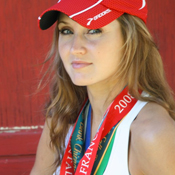Waking Up Is Hard to Do
Have you ever been so tired that you literally forgot you exist? No, really. This is a true, scientific phenomenon. Let me explain.
There are three stages to fatigue:
- “I am so tired.”
- “What day is it?”
- “Wait… what is this vague feeling of sentience? Am I alive?”
The last is the most extreme case of tiredness. I have experienced it maybe three times (note: I don’t have kids), the most recent being this morning at the undeniably indulgent time of 7:00 a.m. My iPhone began buzzing its alarm, my eyes opened to a white ceiling of nothingness, and I had no concept of what was supposed to happen next. The very feeling of existence felt unfamiliar.
What is this? What am I? Who am I? What do I do now?
As if by a reluctant reflex, I turned off my alarm. I rubbed my eyes. I climbed out of bed and pulled on my running tights. It was all very Jason Bourne-y. (Other than the whole “the world’s elite assassins are trying to kill you” thing, of course.)
I just got out of bed and put on a pair of spandex pants. I grabbed a GPS watch off a charger. I filled a bottle with water. How would I know how to do that and not even know who I am?
Nanosecond by nanosecond, the particulars of my existence materialized.
I am a runner. I am in the middle of marathon training. And even though I finished yesterday’s run at 10:17 p.m.—my second run of the day, no less—I must once more leave my house in single-digit temperatures and run: eleven miles with five miles at half marathon race pace. And tomorrow, I will forget that today happened and attempt a fifteen-mile mid-week long run.
For all of the feelings of achievement that marathon training kindles, for all of its post-run highs, for all of its moments of self-empowerment, it has a sneaky way of simultaneously marginalizing those very accomplishments. “You hammered an eleven-mile tempo run yesterday? Wow. Great. Good job. Now get over yourself and do it again, you masochistic fool.”
And thus, we awake at 4:40 a.m. on a Sunday morning to run in the snow and reenact our own versions of The Bourne Identity:
I know that the guy who opens the Visitor’s Center doesn’t unlock the doors until exactly 6:07 a.m. I know that he parks on the east side of the lot and vacuums the main lobby first. I know I need to run 6:43s and that the section of Forest Park that loops around the Planetarium is the hilliest and turns into a wind tunnel on breezy days. I know that it is exactly two miles from the top of Skinker to the first stall in the women’s bathroom. Now, how would I know all that and still not know who I am?
Because you’re marathon training, bucko. That’s how.
After two years of inadequate, ramshackle marathon training, I’ve finally decided to bump up the mileage and get serious. No more seven-week training plans. No more one-and-done workouts. This time around, I resolved to log two months of high-mileage base training before launching into a real eighteen-week training program.
And I was doing a good job, too. My mileage wasn’t super high, but I still had a few more weeks to build before training started. To be safe, I pulled up the calendar and counted backwards from race day.
Thirteen weeks.
The middle of my “two-month base” was actually five weeks into the eighteen-week program.
%#!@*
My calendrical shortcomings notwithstanding, I plunged myself into week thirteen, much to the chagrin of my legs, which much prefer base training.
As does my sleep cycle, it turns out. I forgot how time-consuming and exhausting it is to maintain high mileage for several months. Adding ten or twenty miles a week to my average totals has transformed me into a veritable running zombie. I feel like I’M ALWAYS RUNNING. “Didn’t you just run?” my family now asks each time I pull on my compression sleeves.
Why, yes. Yes, I did.
Alas, it’s a good fatigue. Fatigue means I’m training, and training is always better than not training. Plus, as Jake reminds me each time I find myself mired in the first half of marathon training, you have to let your legs catch up to your fitness. Once that happens, you’ll feel less swampy.
As for Jason Bourne Syndrome… That, I’m afraid, is a recreational hazard of running. But, hey, at least we don’t have to deal with all those assassins.
Amiright?

Amy L. Marxkors is the author of The Lola Papers: Marathons, Misadventures, and How I Became a Serious Runner and Powered By Hope: The Teri Griege Story. Click here to receive Amy's weekly article via email.
Connect With Us
see the latest from Fleet Feet St. Louis